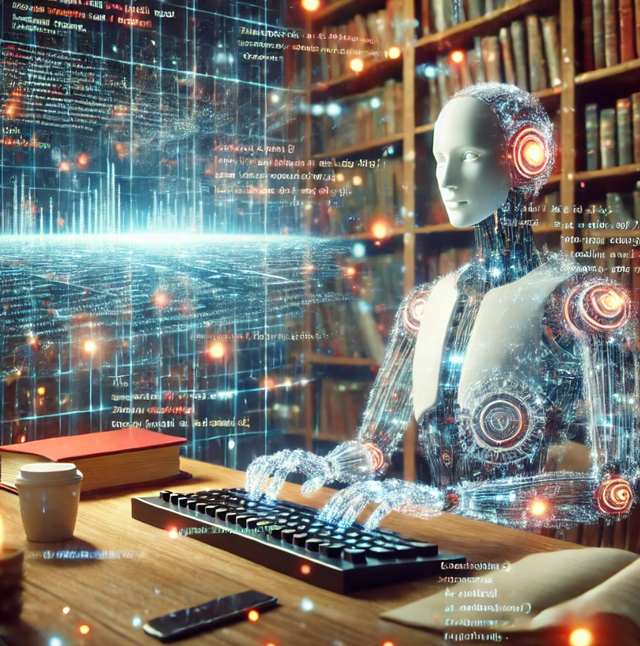Tentang KamiPedoman Media SiberKetentuan & Kebijakan PrivasiPanduan KomunitasPeringkat PenulisCara Menulis di kumparanInformasi Kerja SamaBantuanIklanKarir
2024 © PT Dynamo Media Network
Version 1.81.0
Konten dari Pengguna
The New Age of Authorship: AI in Creative Writing and its Impact on Literature
15 Oktober 2024 18:13 WIB
·
waktu baca 6 menitTulisan dari Suhail Leovietto tidak mewakili pandangan dari redaksi kumparan

ADVERTISEMENT
kumparan Hadir di WhatsApp Channel
Follow
In 2015, an AI-generated short story titled “The Day Computers Write Novels” made headlines after it was selected for a prestigious science fiction writing competition. This astonishing achievement marked a watershed moment in the evolving relationship between artificial intelligence and creative writing. Once confined to the technical realm, AI has now entered the literary realm, producing novels, poems, and even essays with remarkable fluidity. As these technologies advance, they challenge long-held beliefs about what it means to be a writer and how we define creativity. AI-generated content is no longer a futuristic concept; it is transforming our understanding of authorship, originality, and the value of literature today. While some celebrate the democratization of content creation, others must grapple with the ethical and cultural implications of allowing machines to enter a space once dominated by human ingenuity. How we navigate this intersection of technology and creativity will shape the future of literature.
ADVERTISEMENT
Traditionally, the concept of authorship has been closely tied to the human experience, with writing seen as a reflection of personal thoughts, emotions, and creativity. However, the rise of AI-generated content is challenging this notion, prompting us to rethink the very essence of what it means to be a writer. With AI tools like GPT-3 and others capable of generating prose, poetry, and even entire books, the lines between human and machine creativity are blurring. While some view AI as a powerful tool for augmenting human creativity, allowing writers to collaborate with technology to brainstorm, refine language, or overcome writing block, others worry that it could diminish the role of human writers altogether. Notable works, such as “1 the Road,” an AI-written novel modeled after Jack Kerouac’s On the Road, have garnered both praise and skepticism. These works invite readers to question the value of originality, as well as whether the emotional depth found in human-written literature can be replicated by machines. Reception of such works has been mixed, highlighting the tension between acceptance of AI as a co-creator and fear of its potential to replace the art of human authorship.
ADVERTISEMENT
One of the most significant ethical issues surrounding AI-generated content is the question of originality. Can something produced by a machine really be considered original, or is it simply a sophisticated form of plagiarism? AI systems are trained on vast amounts of existing data, culled from books, articles, and other creative works to generate new content. This reliance on pre-existing material raises concerns about whether AI creations are simply regurgitations of the work that has already been put into them. Furthermore, intellectual property issues become increasingly complex. Who owns the rights to AI-generated written works, the developers who programmed the AI, the users who pushed the machine, or does it fall into a gray area where no one can claim ownership? Legal systems around the world are grappling with this question, with some courts ruling that AI-generated works cannot be copyrighted because they lack human authorship, while others have left the door open for users to claim ownership. This uncertainty has led to disputes, as creators and companies alike navigate the changing landscape of authorship and copyright in the age of AI. As technology continues to evolve, so must our legal framework, which is currently ill-equipped to deal with the complexities of machine-generated content.
ADVERTISEMENT
AI-generated content has undeniably made creative writing more accessible to a wider audience. With AI tools widely available, individuals who may not have had formal training or the confidence to write can now craft stories, poems, or articles with ease. This democratization of creative writing lowers the barriers to entry, allowing more people to express themselves through literature. AI also bypasses traditional gatekeepers in publishing, offering writers the opportunity to share their work directly with readers without navigating the often selective and exclusive world of literary agents and publishers. However, this surge in AI-assisted content raises important questions about the quality and standards of literature. While AI tools enable greater participation, they also contribute to the rapid production of content, potentially flooding the market with formulaic or mediocre work. Some argue that this devalues the effort and artistry of human writers who painstakingly craft their stories. As AI-generated work proliferates, the challenge will be to distinguish between content that enriches the literary landscape and content that simply fills a gap, raising the question of whether the technology is enhancing creativity or diluting it.
ADVERTISEMENT
As AI-generated content becomes more common, we are forced to reconsider what readers consider important in creative writing. Do readers care whether a story is created by a human or a machine, or is emotional resonance the only thing that matters? For many, the emotional connection to a narrative and how it moves, inspires, or challenges them is more important than the origin of the work. This shift in reader expectations is particularly pronounced in genre fiction, where AI-generated stories are increasingly in demand. In genres like science fiction and fantasy, which are often driven by complex world-building and plotting, AI-assisted storytelling can help create narratives that satisfy readers’ thirst for imaginative, expansive storytelling. But as AI continues to produce more of these stories, the line between cultural value and commercial content creation is blurring. Are AI-generated works enriching our literary culture, or are they simply commercialized, formulaic, and designed to satisfy mass consumption? This tension between cultural contribution and commercial interest challenges us to reflect on how we engage with literature and what we believe gives it its value.
ADVERTISEMENT
The rise of AI in creative writing is changing the way we think about authorship, originality, and literary value. While AI poses significant challenges to traditional notions of what it means to be a writer, it is also opening new doors to democratize content creation, allowing more people to participate in the literary process. As AI-generated work becomes more commonplace, the implications for writers, readers, and the publishing industry are profound. Will human creativity remain at the forefront, or will AI-driven content redefine the way we consume and create literature? Looking ahead, it is clear that the role of AI in literature will only grow, requiring ongoing ethical discussions and the development of frameworks that balance innovation with respect for artistic integrity. In the face of this technological shift, it is critical that we approach AI in the creative space with caution and curiosity, ensuring that AI enhances, rather than diminishes, the art of storytelling.
ADVERTISEMENT

